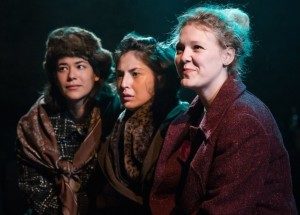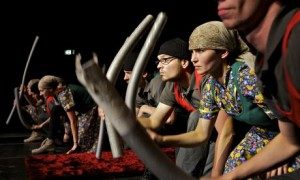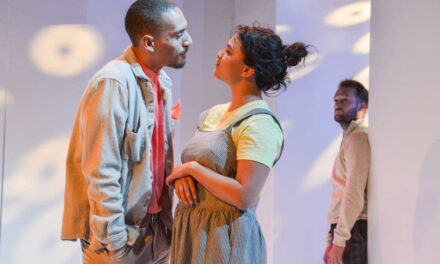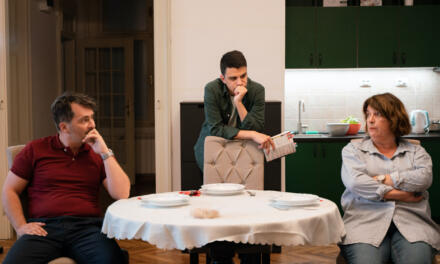Simplified Production Deserves The Benefit Of The Doubt.
Tracy Letts’ adaptation of Chekhov’s 1900 play–directed by Phil Wilmott–gives an English, deadpan intonation to Russian humor. The expansive, often ironic comedy characteristic of Chekhov’s plays persists even though Letts has cut and altered considerable portions of the original text.
The layout of the Union Theatre in Southwark, which has the audience sitting against all four walls with the actors in the center of the room, gives the impression of clandestine observation. The director’s attention to detail heightens this atmosphere, as the steam floating from a cup of tea adds a ghoulish note to the semi-darkness characterizing the second half of the play. Performances add authenticity too: the housekeeper Anfisa, as played by Corinna Marlowe, manages to display luminous radiance even in a quiet, secondary role. Facial expressions are genuine and apt for the spontaneity of domestic discussion–Ivy Corbin as the skeptical Masha being a particular example of this. Masha’s husband Kulygin (Steven Rodgers) is a distinct–though representative–figure of comic relief, described as obnoxious by the other characters. The scene in which everyone gathers around a spinning top hits the spot emotionally: it seems as though all of the characters have returned collectively to childhood–the audience itself caught up in the hypnotic experience too.
The exchanges between Masha and Colonel Vershinin–an intense Ashley Russell–succeed in portraying the incipience of a possible, realistic love story. Yet the production fails to accentuate the drama between the two: Masha and Vershin’s tumultuous affair is glossed over here, thus effacing the nobility of her husband’s forgiveness: as a result the latter’s complexity is effectively flattened: he becomes a simplified, one-dimensional character, and one of the play’s dramatic peaks is lost. Natasha, played well by Francesca Burgoyne, is more amusing than villainous here: arguably another scorching of drama, reducing the play to the girls’ wistfulness and obsession for their native Moscow, to which they collectively desire to return.
These modifications present a series of questions. Is this production too Anglicized? Do we still have our Chekhov? Where do we draw the line? Might attention have been paid to the Russian spirit with which Chekhov’s associated–rough and whimsical at the same time? When Masha says to Chebutykin, played by J.P Turner, “You’re like a bloody sixty-year-old baby,” the domestication of Chekhov’s language seems exaggerated–and incongruous.
The cast here doesn’t fail to impress, but one must certainly be open-minded to accept such a simplification of plot and of language. Yet if you believe the virtue of a play in 2017 to be its universal accessibility, this production deserves the benefit of the doubt.
This post originally appeared on CEEL.org.uk on January 27, 2017, and has been reposted with permission.
This post was written by the author in their personal capacity.The opinions expressed in this article are the author’s own and do not reflect the view of The Theatre Times, their staff or collaborators.
This post was written by Andreea Scridon.
The views expressed here belong to the author and do not necessarily reflect our views and opinions.


















